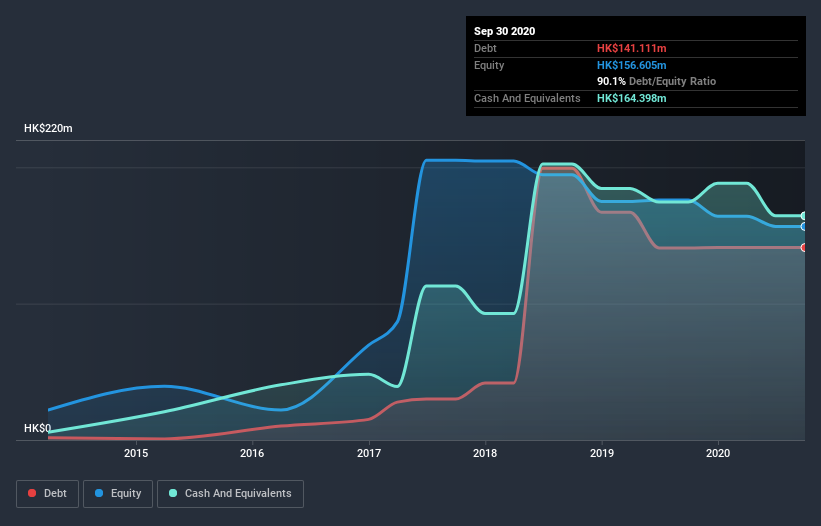- Hong Kong
- /
- Construction
- /
- SEHK:1630
Kin Shing Holdings (HKG:1630) Has Debt But No Earnings; Should You Worry?

Legendary fund manager Li Lu (who Charlie Munger backed) once said, 'The biggest investment risk is not the volatility of prices, but whether you will suffer a permanent loss of capital.' It's only natural to consider a company's balance sheet when you examine how risky it is, since debt is often involved when a business collapses. Importantly, Kin Shing Holdings Limited (HKG:1630) does carry debt. But the real question is whether this debt is making the company risky.
When Is Debt A Problem?
Generally speaking, debt only becomes a real problem when a company can't easily pay it off, either by raising capital or with its own cash flow. If things get really bad, the lenders can take control of the business. However, a more common (but still painful) scenario is that it has to raise new equity capital at a low price, thus permanently diluting shareholders. Of course, plenty of companies use debt to fund growth, without any negative consequences. The first thing to do when considering how much debt a business uses is to look at its cash and debt together.
Check out our latest analysis for Kin Shing Holdings
How Much Debt Does Kin Shing Holdings Carry?
The chart below, which you can click on for greater detail, shows that Kin Shing Holdings had HK$141.1m in debt in September 2020; about the same as the year before. However, its balance sheet shows it holds HK$164.4m in cash, so it actually has HK$23.3m net cash.

A Look At Kin Shing Holdings's Liabilities
The latest balance sheet data shows that Kin Shing Holdings had liabilities of HK$199.2m due within a year, and liabilities of HK$209.0k falling due after that. Offsetting these obligations, it had cash of HK$164.4m as well as receivables valued at HK$154.1m due within 12 months. So it can boast HK$119.2m more liquid assets than total liabilities.
This surplus strongly suggests that Kin Shing Holdings has a rock-solid balance sheet (and the debt is of no concern whatsoever). On this basis we think its balance sheet is strong like a sleek panther or even a proud lion. Simply put, the fact that Kin Shing Holdings has more cash than debt is arguably a good indication that it can manage its debt safely. The balance sheet is clearly the area to focus on when you are analysing debt. But it is Kin Shing Holdings's earnings that will influence how the balance sheet holds up in the future. So if you're keen to discover more about its earnings, it might be worth checking out this graph of its long term earnings trend.
Over 12 months, Kin Shing Holdings made a loss at the EBIT level, and saw its revenue drop to HK$418m, which is a fall of 36%. To be frank that doesn't bode well.
So How Risky Is Kin Shing Holdings?
While Kin Shing Holdings lost money on an earnings before interest and tax (EBIT) level, it actually generated positive free cash flow HK$35m. So taking that on face value, and considering the net cash situation, we don't think that the stock is too risky in the near term. There's no doubt the next few years will be crucial to how the business matures. There's no doubt that we learn most about debt from the balance sheet. But ultimately, every company can contain risks that exist outside of the balance sheet. Be aware that Kin Shing Holdings is showing 4 warning signs in our investment analysis , and 1 of those is concerning...
When all is said and done, sometimes its easier to focus on companies that don't even need debt. Readers can access a list of growth stocks with zero net debt 100% free, right now.
If you decide to trade Kin Shing Holdings, use the lowest-cost* platform that is rated #1 Overall by Barron’s, Interactive Brokers. Trade stocks, options, futures, forex, bonds and funds on 135 markets, all from a single integrated account. Promoted
Valuation is complex, but we're here to simplify it.
Discover if Kin Shing Holdings might be undervalued or overvalued with our detailed analysis, featuring fair value estimates, potential risks, dividends, insider trades, and its financial condition.
Access Free AnalysisThis article by Simply Wall St is general in nature. It does not constitute a recommendation to buy or sell any stock, and does not take account of your objectives, or your financial situation. We aim to bring you long-term focused analysis driven by fundamental data. Note that our analysis may not factor in the latest price-sensitive company announcements or qualitative material. Simply Wall St has no position in any stocks mentioned.
*Interactive Brokers Rated Lowest Cost Broker by StockBrokers.com Annual Online Review 2020
Have feedback on this article? Concerned about the content? Get in touch with us directly. Alternatively, email editorial-team@simplywallst.com.
About SEHK:1630
Kin Shing Holdings
An investment holding company, engages in erecting formworks for construction works in private residential and commercial buildings in Hong Kong.
Mediocre balance sheet and slightly overvalued.
Market Insights
Community Narratives





